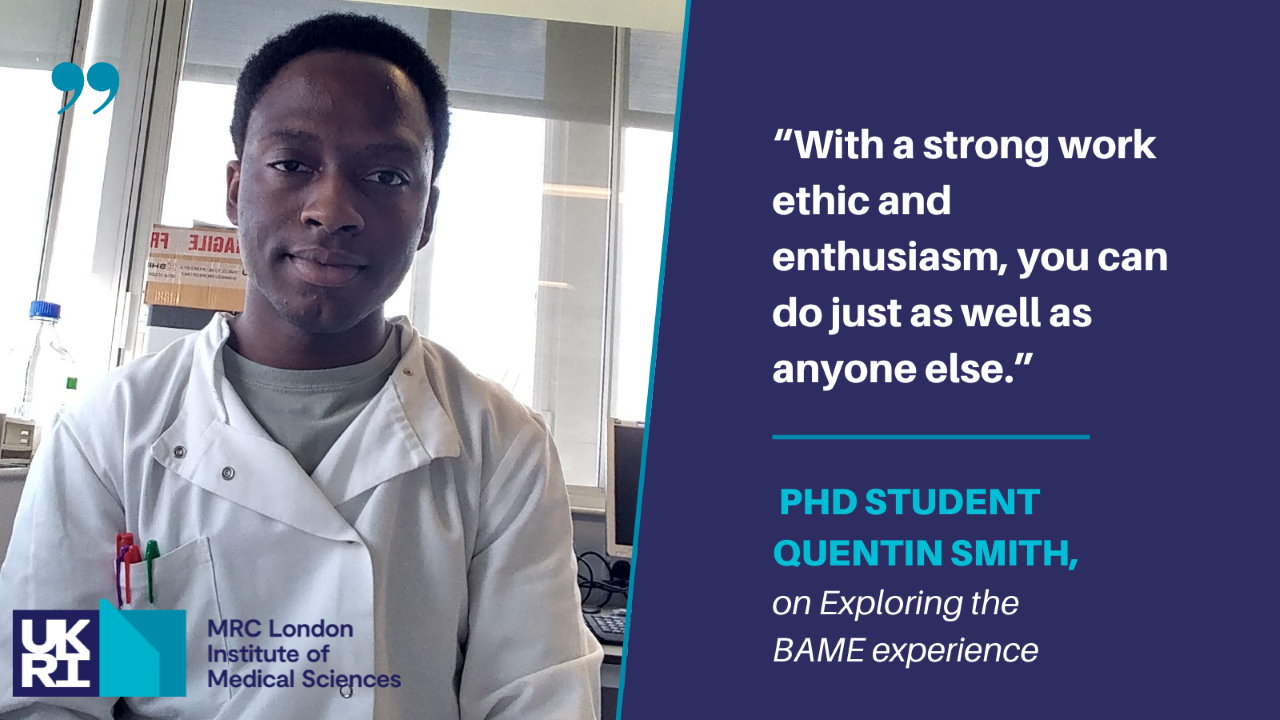By Lindsay Keith
November 23, 2022
Time to read: 5 minutes

Imperial As One – Belonging: Exploring the BAME Experience podcast is a platform created to discuss the experiences of the BAME (Black, Asian, and Minority Ethnic) communities, and explore diversity issues related to feeling a sense of belonging. In the most recent episode, our PhD student, Quentin Smith, navigates us through his life as a scientist of Black/Caribbean heritage. From being raised by a single mother in London to becoming a PhD student at the LMS, Quentin shares his own sense of belonging.
“What gave you your sense of belonging and identity growing up?”
Quentin starts by giving us a glimpse into his childhood, painting vivid pictures of his mum writing essays for her studies whilst working multiple jobs, and taking care of Quentin and his siblings. ‘It is not easy being a minority’ and it is also not easy to break the stigma around children raised by single parents.
“My mother always supported me and inspired me to work hard” says Quentin gratefully. It was through his mom that the importance of education was instilled into him. From an early age, Quentin developed a strong interest in biology. He became increasingly curious on how fundamental biological mechanisms work and how diseases develop when there is an error in biological mechanisms.
As Quentin reflects on his days as an undergraduate student, he recalls quickly realising how he enjoyed the practical aspect of biomedical science and went on to spend two consecutive summers gaining hands-on experience in the lab. His academic supervisor put Quentin in contact with the professors who he worked with in the lab.
Reflecting on his university experience, Quentin noticed a lot of black students leaving their studies behind as the years progressed. He never recalled seeing academics of black heritage and was struck by the fact that less than 1% of academics in the UK are black. He speculated that this could be traced back to the notion that so many black students were leaving their undergraduate studies.
“As a minority there are not many of us in the first place.” says Quentin.
Thankfully, he says he had an excellent support network to keep him going. He aspires to become a professor himself and be the black academic he never saw during his studies. Quentin is motivated to be the voice for minorities and remind them that they can make it– no matter their background.
“With a strong work ethic and enthusiasm, you can do just as well as anyone else.”
Applying for his PhD at the LMS, Quentin initially got rejected but he didn’t let that stop him. He went on to contact his-now-PI and eventually managed to get to the interview stage. On the day of his PhD interview, in a room of around 60 people, Quentin quickly noticed he was the only black person. And while you would think that London is a very multicultural environment, the lack of diversity in academia is clearly visible. From the very start, there are very few black people that enter PhD positions. Quentin recalls questioning himself, asking “what am I doing here?” with him being the only black person in the room.
How does he make the Imposter syndrome fade away?
“You have to be your own hype man” Quentin replied.
“I didn’t let it affect me” Quentin said as he wanted to make sure he performed the best he could in his interview. Being the only one didn’t stand in Quentin’s way. Words of affirmation like “You are worthy to be here” are thoughts Quentin instilled in himself.
But most importantly Quentin recognizes the pivotal role of his support network. His passion and enthusiasm in combination with the right people made the perfect mix for Quentin’s success.
“Without these people, I don’t know where I would be” talking about his academic mentors, but also his family and friends.
At the LMS, Quentin recently became the president of the EDI forum which aims to address and understand problems within the institute related to equality, diversity and inclusion.
He also supports black students at Imperial College where he is part of several schemes supporting students from ethnic minorities.
Recognizing the positive impact his mentors had on his career, Quentin wants to do the same for students like him. He wants to give back and show people from minorities that “you can do it too.”.
Closing his interview Quentin talked about his plans for the future and next steps in his career. Quentin plans to continue to grow his network to eventually be put in contact with people that will support his next steps. He wants to continue being a mentor for students from ethnic minorities guiding them and providing the needed support.
To students “being the only one in the room” when applying for PhD positions, Quentin has the following advice;
“ – Remember you are there for a reason
– Speak with your potential PI in advance to establish your interest.
– Do not get overwhelmed, stay focused”
Quentin is in the Single Molecule Imaging Group at the LMS and you can watch his interview on YouTube
This blog was written by Isabella Giokari.